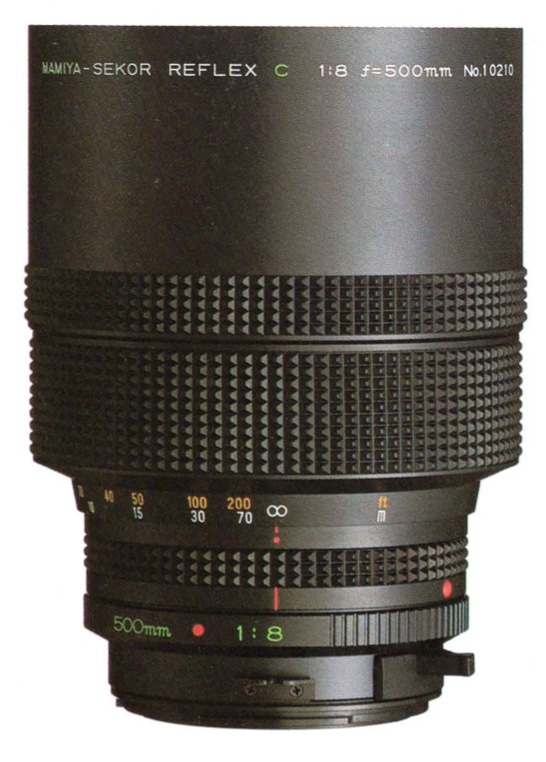Mamiya-Sekor C 500mm F/8 Reflex
Super telephoto prime lens • Film era • Discontinued
- Announced:
- · 1982
- Production status:
- ● Discontinued
- Country of design:
- · Japan
- Original name:
- · MAMIYA-SEKOR REFLEX C 1:8 f=500mm
- Class:
- · Slow 6x4.5 medium-format super telephoto prime lens
- · Professional model (Top class)
- · Mirror/Reflex lens
- System:
- · Mamiya M645 (1975)
Abbreviations
| C | Multi-layer anti-reflection coating is applied to the surfaces of lens elements. This anti-reflection coating increases light transmission, eliminates flare and ghosting, and maintains color consistence among all lens models. |
Specification
| Optical design: | |
| Medium format 6x4.5 | |
| 500mm | |
| F/8 | |
| 7 elements in 5 groups | |
| Mamiya M645 [63mm] | |
| 8° | |
| Diaphragm mechanism: | |
Diaphragm type: | Fixed |
Aperture control: | None |
| Focusing: | |
| 4m | |
| 1:7.14 | |
Focusing modes: | Manual focus only |
Manual focus control: | Focusing ring |
| Physical characteristics: | |
| 880g | |
| ⌀101×135mm | |
| Accessories: | |
| Removable front filters are not accepted | |
| Built-in telescopic round | |
| Mamiya M645 Teleconverter 2X N → 1000mm F/16 |
Sources of data
- Mamiya-Sekor C interchangeable lenses for Mamiya M645 instructions.
- Mamiya-Sekor C interchangeable lenses for Mamiya M645 Super/ M645 instructions.
- Mamiya M645 booklet (1982).
- Mamiya M645 instructions (II).
- Mamiya M645 1000S instructions.
- Mamiya M645J instructions (II).
Typical characteristics of mirror (reflex) lenses
- Catadioptric system consisting of curved mirrors and optical glass;
- Much shorter, lighter and less expensive designs than conventional super telephoto lenses;
- Outstanding correction of chromatic aberrations;
- Since the aperture is fixed, neutral density filters are used to obtain a smaller aperture;
- Doughnut-shaped out-of-focus highlights.
